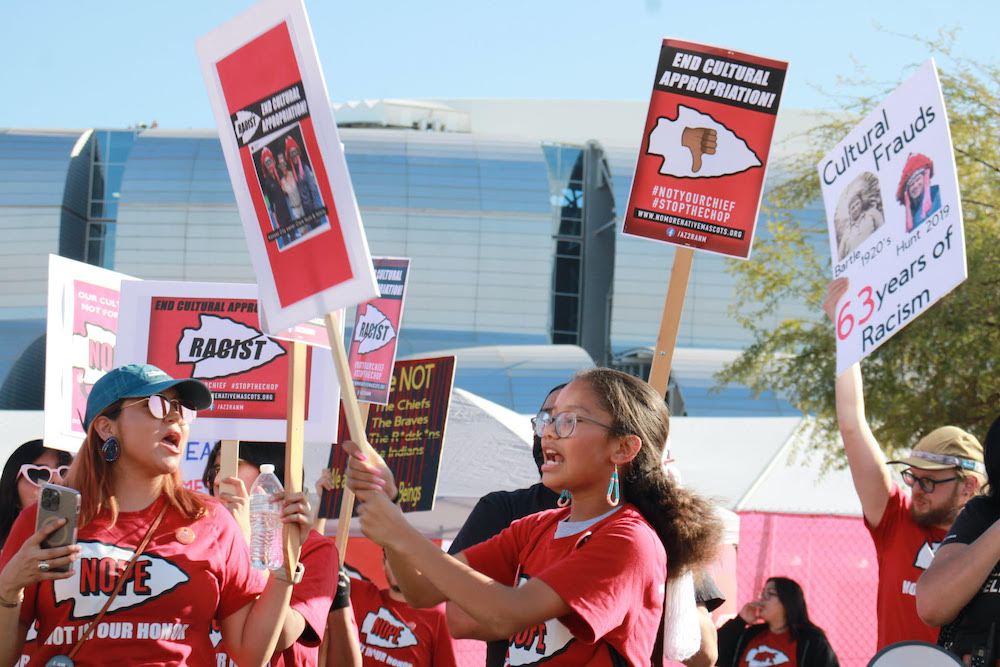
- Details
- By Darren Thompson
GLENDALE, Ariz—Protesters demanded the National Football League (NFL) abolish race-based mascots and imagery, taking their disapproval to State Farm Stadium, where Super Bowl LVII was played on Sunday.
The Philadelphia Eagles and Kansas City Chiefs played at the NFL’s largest stage, in front of a sold out crowd of 64,300 live spectators and millions of television viewers around the world.
The protest was organized to challenge Kansas City to abandon its team name and mascot —the “Chiefs”—as well as the organization’s fan-driven “tomahawk chop.”
“As Indigenous people, we will not be mocked,” said Amanda Blackhorse, one of the organizers for the Arizona to Rally Against Native Mascots demonstration on Sunday. “Our culture is not for sale, and we must end cultural appropriation.”
A group of approximately 100 people marched through the Westgate Entertainment district to one of the entrances to State Farm Stadium.
“Stop the Chop! Change the Name!” shouted a crowd of largely Indigenous participants.
“We’re not caricatures! We are not stereotypes! We are people,” protesters shouted to the crowd as they headed to the Super Bowl.
Bystanders were seen mocking protesters by mimicking the “tomahawk chop” and dancing in the street, laughing at the group of largely Indigenous women who attended the protest.
In 2020, the Chiefs banned fans from donning headdresses, war paint and clothing at Arrowhead Stadium. Those rules apparently were not in effect at the Super Bowl, as a Chiefs fan was seen walking through the crowd holding a replica of a Northern Plains Tribes headdress. Using Native American mascots and imagery has been found to be harmful to Native people, according to the American Psychological Society.
Native News reached out on Saturday to the NFL and the Kansas City Chiefs for comment on the rules for fans wearing headdresses or war paint at the Super Bowl game, but did not hear back from either.
This year’s Super Bowl took a historic leap of including Indigenous people and culture in many parts of its largest game of the year. Protesters acknowledge the historic inclusion of Indigenous culture in the Super Bowl, but still demand the NFL intervene and pressure their teams to rid the use of the race based mascots.
“I stand in solidarity and sisterhood with all those in the no-mascots movement,” said Suzan Shown Harjo in an email to Native News Online. “These ‘Native’ sports personae are harmful to real Native Peoples, especially to our children and young adults, and must come to an end.”
Harjo, a Cheyenne & Hodulgee Muscogee Medal of Freedom Recipient, organized a national coalition to issue a statement calling for an end of “Native” mascots.
“The Native Artists Coalition to End ‘Native’ Mascots stands in solidarity with the Native People and organizations in the Kansas City area, whose children and families bear the most immediate impact and harm of redfacing and arrowhead chopping spawned by the Kansas City NFL “Chiefs” franchise,” said the Morning Star Institute in a statement on Sunday. “While the Kansas City franchise profits from its “Native” identity and pays consultants to organize and secure good will from some who are outside the Kansas City area, it refuses to even meet with the actual Native People in the Kansas City area.”
Both Harjo and Blackhorse were instrumental in the movement to challenge to use of the word, “Redsk!ns” by the Washington NFL football team. After years of pressure, the Washington football team retired its name on Monday, July 13, 2020. Some of the largest protests in American sports history were to push for professional sports teams to rid their use of Native theme mascots and imagery.
More Stories Like This
Native News Weekly (August 25, 2024): D.C. BriefsCheyenne River Youth Project to Celebrate Women’s Strength at Barbie-Themed Passion for Fashion on March 14
Celebrating Native American Women
Native Bidaské: The Illusion of Freedom and the Myth of America 250, Leonard Peltier Speaks Out
Monday Morning (March 2, 2026): Articles You May Have Missed This Past Weekend
Help us defend tribal sovereignty.
At Native News Online, our mission is rooted in telling the stories that strengthen sovereignty and uplift Indigenous voices — not just at year’s end, but every single day.
Because of your generosity last year, we were able to keep our reporters on the ground in tribal communities, at national gatherings and in the halls of Congress — covering the issues that matter most to Indian Country: sovereignty, culture, education, health and economic opportunity.
That support sustained us through a tough year in 2025. Now, as we look to the year ahead, we need your help right now to ensure warrior journalism remains strong — reporting that defends tribal sovereignty, amplifies Native truth, and holds power accountable.
 The stakes couldn't be higher. Your support keeps Native voices heard, Native stories told and Native sovereignty defended.
The stakes couldn't be higher. Your support keeps Native voices heard, Native stories told and Native sovereignty defended.
Stand with Warrior Journalism today.
Levi Rickert (Potawatomi), Editor & Publisher

